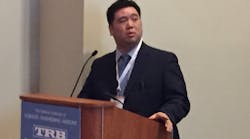A study conducted by the Tennessee Department of Transportation (TDOT) recently concluded that if anywhere from 5% to 25% of manufacturing activity in East Asia shifted back to the U.S. over the next five to 10 years – a process widely known as “reshoring” – truck activity in terms of overall trips and mileage might actually decline, which is the opposite of what other analysis indicates.
Jaehoon Kim, a forecasting office supervisor with TDOT’s long-range planning division, presented a paper at the 97th annual meeting of the Transportation Research Board (TRB) in Washington D.C. this week that truck trip “generation” would decline 10.8% to 11.4% from reshoring 5% to 20% of East Asian manufacturing activity to the U.S.
Mileage would decline more, Kim noted in his paper – dubbed Changes in Freight Distribution and Movement in the United States Due to the Reshoring Trends – especially as the percentage of reshored manufacturing increased.
According to his calculations, mileage would decline between 10.6% and 17% from reshoring manufacturing 5% to 20% of East Asian manufacturing activity.
Kim noted that his study encompassed 129 “zones” across the U.S. mainland that could serve as “possible locations” for relocating manufacturing facilities from East Asia.
He also stressed that there are “positive impacts” from decreased total ton-miles traveled and total truck-miles traveled due to reshoring.
“Congestion around major ports will be decreased,” he said, with fuel consumption by commercial vehicles, greenhouse gas (GHG) emissions, and truck crashes also declining, according to Kim’s analysis.
That being said, freight activity would increase due to reshoring, he noted, especially in key urban areas such as Los Angeles, Chicago, Dallas-Ft. Worth and Detroit, along with rural zones in Wisconsin and Pennsylvania.



